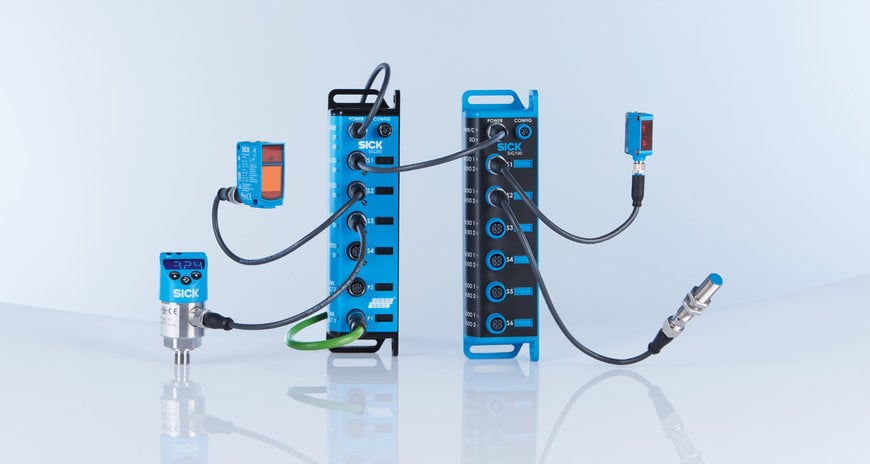www.ptreview.co.uk
19
'20
Written on Modified on
SICK’S SIG200 IS AN IO-LINK MASTER AND CONTROL SYSTEM IN ONE
SICK has unveiled its SIG200 PROFINET Sensor Integration Gateway, the first in a family of intelligent Industry 4.0 gateways designed to work as both IO-Link Masters and small, distributed control systems in one.

It makes light work of configuring localised sensor applications and, at the same time, opens up high-speed transfer of sensor status, parameter and diagnostics data with enterprise-level or cloud-based systems.
SICK’s SIG200 Sensor Integration Gateway is an IO-Link Master with an on-board web server that collects, combines, evaluates and transmits signals from IO-Link devices from any manufacturer.
SICK’s innovative DualTalk technology means the SIG200 needs only one cable to communicate simultaneously via the fieldbus with the machine controller and with higher-level enterprise or web-based systems.
Data can be integrated transparently into both common PLC environments and higher-level systems. The SIG200’s built-in logic and remote intelligence make it quick and easy for engineers to create and run distributed sensor applications, even independently of the PLC.
“The beauty of the SIG200 is that it offers all the Industry 4.0 benefits of setting up a system using an IO-Link Master, PLC and sensors. Alternatively, it opens a second route, where you can by-pass the PLC and create your own data gathering system linking straight to the cloud,” explains David Hannaby, SICK’s UK Product Manager for Presence Detection.
“Engineers will find it easy to configure and visualise an automation solution with the SIG200,” Hannaby continues: “The SOPAS logic editor has a great drag and drop function so you can visualise all the connected sensor and actuator signals and measured values without the need for special software knowledge. It saves a huge amount of programming time, effort and cost.
“Process control functions, for example activating a mechanical pusher to reject products from a conveyor system, can be configured and set to operate autonomously without the need for the PLC. So, the communication load in the fieldbus is reduced at the same time.”
The SICK SIG200 makes it easy to solve simple application tasks using binary switching signals or measured values from IO-Link sensors and actuators without an additional control. Meanwhile diagnostics, process parameters, and status information from IO-Link devices e.g. for condition monitoring or predictive maintenance, can be accessed both at the machine and company level. Data from the SIG200 can be exchanged rapidly with MES, ERP and cloud-based software applications and a REST API interface enables integration with web-based software.
Each SICK SIG200 has four master ports for connecting any IO-Link sensors and actuators. Its flexible data integration can even be extended to standard binary sensors with SICK’s SIG100 sensor hub, that can be used to bundle up to twelve standard I/Os in a single IO-Link data packet, which can then be communicated to machine controllers and cloud-based systems via the SIG200. A maximum of 52 I/Os can be connected to one SIG200 by using SICK SIG100.
The SICK SIG200 uses SICK’s SOPAS Engineering Tool software as a powerful and intuitive user interface which can be accessed with a PC via standard M8 USB, Ethernet or a web browser of choice. The easy-to-use Logic Editor within SOPAS enables the user to visualize all connected signals and solve application tasks quickly and easily using drag and drop logic blocks.
An embedded IODD (IO-Link device description) interpreter allows the user to configure both the SIG200 and connected IO-Link devices by simply uploading the IODD files. Using SICK SOPAS, parameterisation of connected devices is straightforward, and device replacement is easy. This is not restricted to SICK products, the SIG200 can work with any third-party products if the IODD file is accessible.
Through its growing family of Sensor Integration Gateways, SICK’s vision is to offer a scaled portfolio to support integration into fieldbus environments and higher automation hierarchies. Initially available with the PROFINET Ethernet fieldbus protocol, additional fieldbus versions of the SIG200 will follow in future.
www.sick.com

